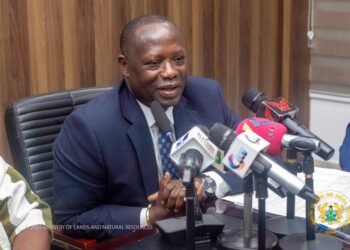In a promising turn of events for Ghana’s economy, Fitch Solutions has presented a positive outlook in its January 2024 Sub Saharan Africa Quarterly Update. The forecast indicates a substantial easing of inflation throughout the year for Ghana, averaging at 18%, aligning closely with the Bank of Ghana’s projection of 15%±2% by the end of 2024.
According to Mike Kruiniger, Senior Country Risk Analyst at Fitch Solutions, statistical base effects played a pivotal role in the drop of inflation to 26% in November 2023. This trend is expected to persist in 2024, with a notable contribution from a robust exchange rate. The convergence of these factors sets the stage for a more stable economic environment in Ghana.
As Fitch Solutions anticipates a significant inflation decline, it foresees a proactive response from the Bank of Ghana. The prediction suggests a monetary policy cycle, marked by a substantial policy rate cut. Fitch Solutions projects a cumulative reduction of 800 basis points throughout 2024, with the policy rate reaching 22%. This move is seen as a strategic measure to further stimulate economic activity and foster growth.
Mike Kruiniger emphasizes the potential time lag for the impact of lower interest rates to permeate the real economy. Despite this, Fitch Solutions holds an optimistic view, anticipating a strong surge in consumption growth in the latter half of 2024. This suggests that the envisaged policy measures may play a crucial role in rejuvenating consumer spending, a key driver of economic expansion.
The projected policy rate cut not only underscores the central bank’s commitment to economic stability but also reflects a strategic move to propel growth in various sectors. Lower interest rates can potentially encourage investment, leading to increased business activities and job creation.
The positive outlook presented by Fitch Solutions aligns with the notion that a stable economic environment is conducive to attracting investments and fostering resilience. As Ghana positions itself for inflation easing and policy-driven growth, businesses and consumers alike may find a more favorable backdrop for their financial activities.
Projections to Fuel Economic Growth
Fitch Solutions anticipates that the projected policy measures, particularly the substantial policy rate cut of 800 basis points by the Bank of Ghana, will play a pivotal role in fueling economic growth in Ghana throughout 2024.
This is because a significant reduction in the policy rate typically translates to lower interest rates on loans and credit. This, in turn, makes borrowing more affordable for businesses and individuals. With cheaper credit, consumers may be more inclined to make big-ticket purchases, such as homes and vehicles, leading to increased consumption.
Moreover, lower interest rates make the cost of borrowing cheaper for businesses. This encourages companies to invest in expansion, research and development, and other growth-oriented initiatives. Increased investment can stimulate job creation, enhance productivity, and contribute to overall economic expansion.
In addition, cheaper credit is conducive to entrepreneurship and small business development. With easier access to funding, startups and small enterprises may flourish, fostering innovation and contributing to a more dynamic business landscape.
Fitch Solutions also attributes the easing inflation to a strong exchange rate. A stable currency and favorable exchange rates create a conducive environment for international trade. This can attract foreign investment, promote exports, and enhance economic stability.
As businesses expand and invest, job opportunities are likely to increase. This, coupled with increased consumer spending, can contribute to a positive feedback loop, where a growing economy generates employment, and employed individuals, in turn, contribute to economic growth through consumption.
The anticipated policy rate cut aligns with a broader economic strategy, potentially involving fiscal stimulus measures by the government. Coordinated efforts between monetary and fiscal policies can create a more comprehensive and impactful strategy for economic recovery.
Clear and decisive monetary policy actions often boost confidence among businesses and investors. The foresight and responsiveness of the central bank can instill confidence in the stability and resilience of the economy, encouraging both local and foreign investors to participate more actively.
Ghana’s policy measures, particularly the anticipated policy rate cut, will fuel economic growth by promoting consumption, investment, business activities, and job creation. These factors collectively contribute to a more dynamic and resilient economic environment for Ghana in 2024.
READ ALSO: Efia Odo Delivers Powerful Message



















